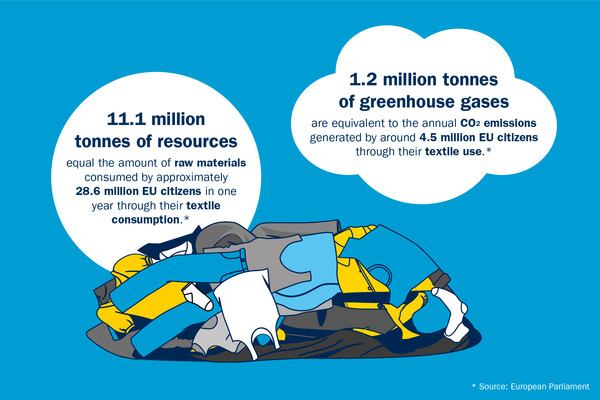Interzero publishes ‘resources SAVED by recycling 2023’ study
Recycling means protecting resources: Interzero saves primary raw materials equivalent to the textiles consumed by 28.6 million EU citizens
+++ Study from Fraunhofer UMSICHT demonstrates positive environmental effects of recycling
+++ Interzero saved around 1.2 million tonnes of greenhouse gases and 11.1 million tonnes of
primary resources in 2023
+++ Europe’s leading circular solutions provider is pushing ahead with textile recycling, which
has tremendous potential to help protect our climate and resources
Berlin/Cologne. With more recycling and fewer resources wasted, managing raw materials in the loop is an effective lever for countering the exploitation of our planet and preventing a further escalation of the climate crisis. This is clearly demonstrated by the ‘resources SAVED by recycling’ study published today, which shows that Interzero, Europe’s leading circular solutions provider, avoided around 1.2 million tonnes of greenhouse gas emissions overall in 2023 by recycling approximately 2.5 million tonnes of recyclables. This is equivalent to the annual carbon emissions generated by the textile consumption of 4.5 million EU citizens. At the same time, Interzero and its customers were able to save more than 11.1 million tonnes of primary raw materials, which is equivalent to the textile resources consumed by around 28.6 million people in the EU in a single year.*
“When we look at the recyclability of textiles, it is clear that recycling holds enormous environmental potential – and why it is so urgently important to push ahead with circular transformation at every level,” said Dr Axel Schweitzer, Chairman of Interzero. “This is particularly true of recyclable materials that are not yet systematically recycled.”
Unlike packaging recycling, for example, textile recycling is still in its infancy. While around 92 million tonnes of textiles are thrown away globally each year, just one percent of this huge material flow currently makes it back into production via fibre-to-fibre recycling.
“We want to work with the textiles industry to close its material loop and use our experience as an established integrated services provider to develop a holistic approach to the take-back, sorting and recycling of textiles,” said Dr Axel Schweitzer. “By doing this, we can ease the burden on the environment and help companies to establish circular solutions that make them competitive and fit for the future.”
The clock is ticking, with new EU regulations such as the separate waste collection requirements being introduced in 2025 and plans for Extended Producer Responsibility (EPR) for textiles and the federal government's National Circular Economy Strategy (Nationale Kreiswirtschaftsstrategie, NKWS) increasing the pressure on companies to take action.
For more than 15 years, Interzero has ensured that the environmental impact of recycling is independently and scientifically verified with the aim of informing, educating and presenting solid arguments for the circular transformation of the economy. The annual report on environmental performance published by the Fraunhofer Institute for Environmental, Safety and Energy Technology (UMSICHT) underlines the lasting impact of Interzero’s work – and helps the circular economy service provider’s customers to communicate transparently on sustainability. Interzero was rewarded for its comprehensive commitment to this cause when it collected the 2024 German Sustainability Award in the Waste Management and Recycling Industry category as well as a special award in the Resources field of transformation.
*These comparisons are based on figures from the European Parliament.
- Interzero
- Press releases
About Interzero:
Interzero is one of the leading service providers in the field of closing product, material and logistics loops as well as innovation leader in plastics recycling with the largest sorting capacity in Europe. Under the guiding principle of “zero waste solutions”, the company supports over 80,000 customers throughout Europe in the responsible handling of recyclable materials, thus helping them to improve their own sustainability performance and conserve primary resources.
With about 2,000 employees, the company achieves a turnover of over one billion euros (2021). According to Fraunhofer UMSICHT, Interzero’s recycling activities could save one million tonnes of greenhouse gases compared to primary production and more than 8.7 million tonnes of primary raw materials in 2022 alone. As a pioneer in the circular economy, Interzero is winner of the German Sustainability Award as well as the related special award in the “Resources” transformation field for 2024.
Further information can be found at www.interzero.com.

